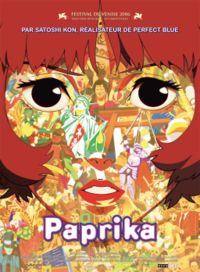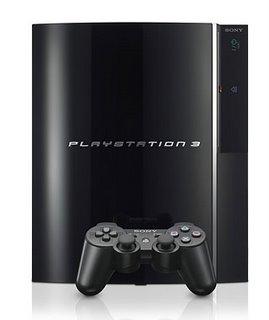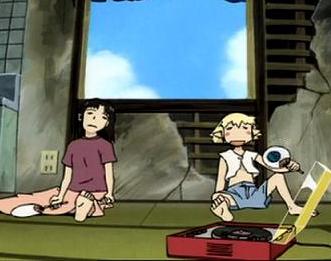 I have already discussed my views on the infamous "sub vs. dub" controversy. I came across an Animenation's "Ask John" entry that supplements my stance (see my June 6, 2006 blog entry).
I have already discussed my views on the infamous "sub vs. dub" controversy. I came across an Animenation's "Ask John" entry that supplements my stance (see my June 6, 2006 blog entry). Here's John's answer:
The debate over dubbing anime is the oldest and most intensely argued topic in American fandom. Every anime fan has an opinion on the subject, and most anime fans, including myself, have voiced their opinion at least once. But there are new fans entering the anime community all the time, so there are always new fans who haven't been exposed to the traditional "sub versus dub" debate. I'll do my best to provide an objective, concise explanation.
There are two primary reasons why some anime fans dislike dubbing. Dubbing is considered a compromise of the original art. And many fans don't like the sound of dubbed anime. Many hardcore anime fans prefer to watch anime the way its creators made it. Dubbing involves removing the original dialogue track and replacing it with one created by people who had no involvement with the original production of the anime. Instead of watching and hearing the anime the way its creators produced it to be seen and heard, viewers watching a dub experience an altered version that does not have the same audible nuances that the original version had. Furthermore, dubbed dialogue is forced to condense or alter the original dialogue, sometimes diverging from the original Japanese script in order to match the character's lip movements. In practical terms, a dub will never be as faithful to the original script as a good subtitle translation.
viewers used to Japanese language anime may find that dubbed anime sounds stilted, unnatural, or unbelievable. An anime character's voice should sound like an integral, natural part of the character, not like an actor performing a role. Many viewers simply find that original Japanese voices fit the characters on screen more believably than English voices.
Viewers who enjoy or prefer dubs often enjoy the convenience of not having to navigate a foreign language and subtitles, and also argue that dialogue in the viewer's native language makes the viewing experience more immersive. Proponents of dubbing also argue that spoken dialogue in the viewer's native language creates the comfortable viewing experience that original creators desire for their audiences.
Presuming that the original purpose of dubbing is to make foreign film more accessible and marketable to a mainstream audience, proponents of original language claim that dubbing is a form of "training wheels," that should serve to gradually transition viewers into watching unaltered, authentic foreign film. Staunch defenders of dubbing accuse proponents of original language of being imperial and elitist. The invention of DVD technology that allows a single video to have selectable dialogue tracks hasn't mellowed the argument because the debate is rooted in principle. Fans of dubbing prefer the convenience of native language dialogue, and enjoy the accessibility of dubbed anime. The improving skill of dub voice actors may enable a dubbed work to have the same impact as the original while being more convenient to watch. Countless subtitle fans argue that dubbing is an unnecessary corruption of the artistic integrity of foreign film; an alteration imposed upon an artwork for the sake of making the art more profitable internationally. For the hardcore proponent of artistic integrity, the quality of a dub is irrelevant because the fundmental principle of dubbing is a corruption of the original artwork.
To view this entry, check out: http://animenation.net/news/askjohn.php?id=1403. I still stand firmly against dubs, but sadly have little hope that things will change drastically, especially with the growing number of American viewers.
 Of all the greatest finds during my trip to Paris, the Manga Cafe sits at the top of my list. When my cousin first told me about the Manga Cafe, my immediate thoughts centered on scenes from "Comic Party" and those you can find all over Japan, but I knew that would be too good to be true.
Of all the greatest finds during my trip to Paris, the Manga Cafe sits at the top of my list. When my cousin first told me about the Manga Cafe, my immediate thoughts centered on scenes from "Comic Party" and those you can find all over Japan, but I knew that would be too good to be true.  Much to my surprise, the Manga Cafe reached beyond any of my expectations. A warm sense of hospitality and a sense of belonging is not without presence. Shelves upon shelves of manga are available at your fingertips for 3 euros for the first hour (4 euros during peak hours). The air and environment of it all is hard to explain, but you really get a sense of an atmosphere that's full of other manga-loving fans. The manager is super nice and even remembered us when we came back for a second visit.
Much to my surprise, the Manga Cafe reached beyond any of my expectations. A warm sense of hospitality and a sense of belonging is not without presence. Shelves upon shelves of manga are available at your fingertips for 3 euros for the first hour (4 euros during peak hours). The air and environment of it all is hard to explain, but you really get a sense of an atmosphere that's full of other manga-loving fans. The manager is super nice and even remembered us when we came back for a second visit.




























































